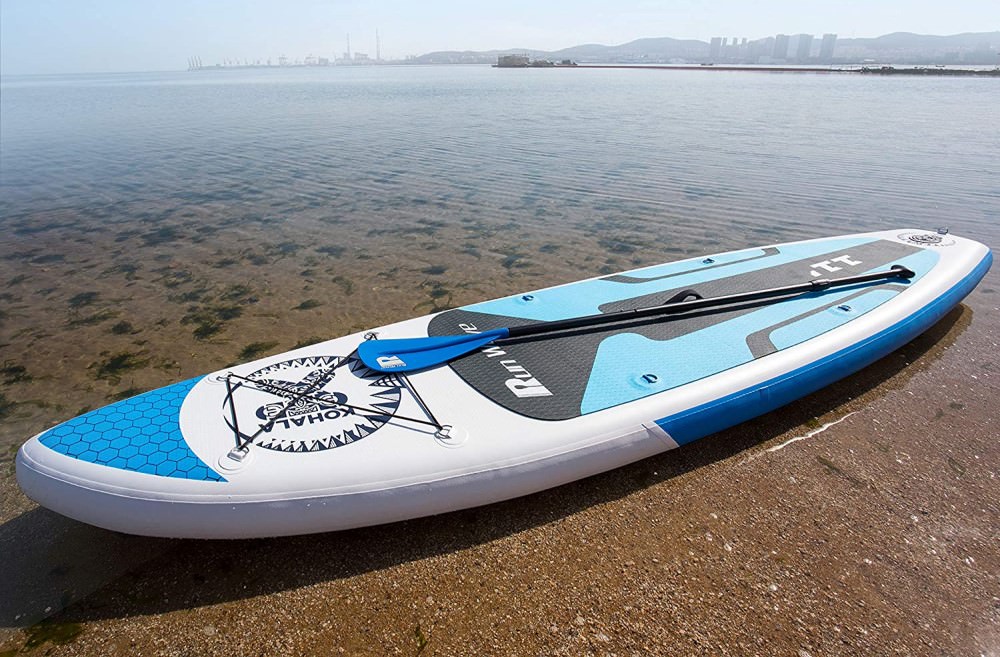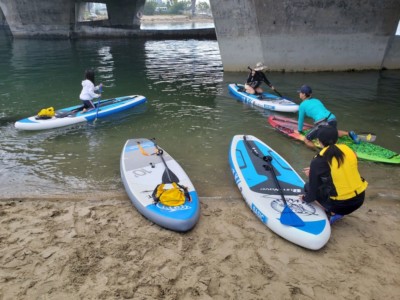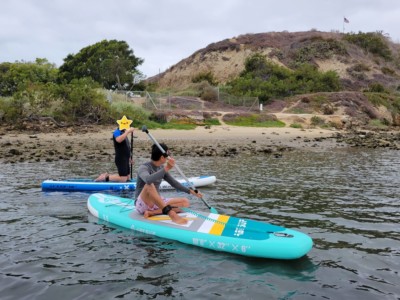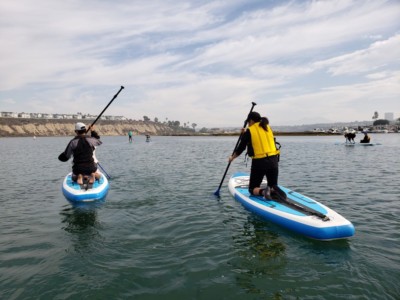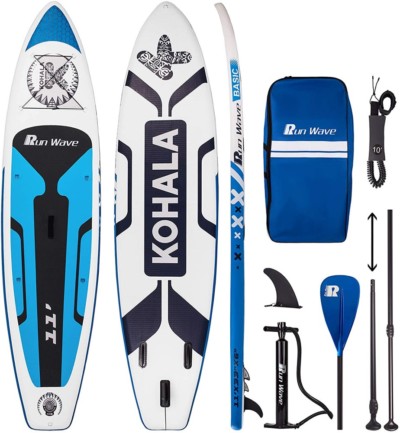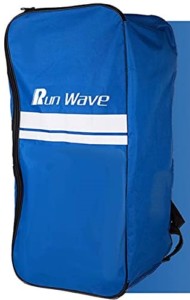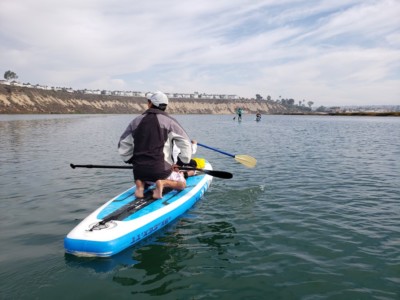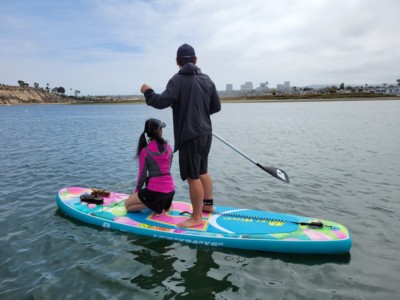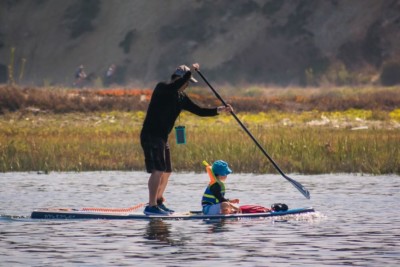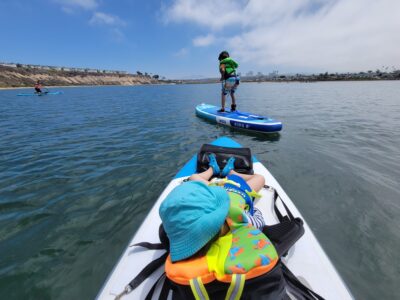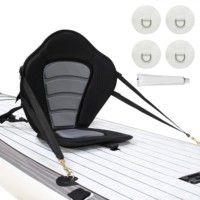Runwave Kohala Inflatable Stand Up Paddle Board iSUP
Contents
Paddle Board for Beginners
About five months ago, my best friend and I each purchased an inflatable, standup paddleboard (iSUP) so we could get some fun exercise in while socially distancing amidst the COVID-19 pandemic. It was also meant as a way to bond with our children, and not long after, many friends joined in with boards of their own. Their favorite was the Runwave Kohala that also proved quite popular around the harbor we paddled at. In this review, I take a look at what makes it an excellent beginner board. It had also been marked a “Best Seller” by Amazon.com a couple times.
The typical rental fee for a SUP in our area runs for $30/person for two hours. So, doing the math for an inflatable SUP at $300, that would equate to 10 rentals for up to 20 hours of use. It made sense for us to purchase one instead to save in the long run. I, personally, own and prefer the DvSport Sunshine, but the benefits of the Runwave Kohala for beginner and recreational use cannot be ignored. There are differences between both boards that this review will go over.
What makes the Runwave Kohala a great beginner paddle board? Are epoxy (solid) SUPs more durable than inflatable ones? As it turned out, no.
Read about iSUP vs SUP (and more) in our guide, Stand Up Paddle Boarding Basics & Tips: How to choose, prepare, maintain, and paddle Inflatable Boards (iSUP)
The Runwave Kohala iSUP uses the single layer construction technique.
What’s Good? What’s Bad?
Pros
- Relatively lightweight: 25 lbs, single-layered
- Less expensive than hard boards
- Fast to deploy/inflate
- First time, it took me 20 minutes reading instructions and looking for the parts
- Second time took roughly 11 minutes to get paddle-ready
- Consider using an electric pump for faster deployment. See TIPS section for more
- Compact and portable
- Folds away easily to the size of a sleeping bag
- Simply deflate, remove specific parts, protect the fins, and roll away
- Takes up less space than hard boards
- Can fit in a smaller car, is easier to carry around, and can be checked in on an airplane (and helps save on rental fees)
- Folds away easily to the size of a sleeping bag
Inflatable SUPs are more durable than hard boards as they won’t scratch or ding when dropped, making them a bit more suitable for rocky, wild adventures
- More durable than hard boards as they won’t scratch or ding when dropped, making them a bit more suitable for rocky, wild adventures
- This did not initially make sense: why would an INFLATABLE be more durable than a HARD board?
- Hard boards are more prone to cracking, scratches, and appearance of holes that require immediate fixing. Who knew?
- This did not initially make sense: why would an INFLATABLE be more durable than a HARD board?
- Causes less injuries than hard boards
- Excellent board for beginners and leisure paddling
- Inflatables cause less fatigue
- Excellent stability aided by its 6″ inflated thickness, 33″ width, 11′ length
- Volume was not provided. To get an estimate, take about 24% off the dimensions to account for the irregular shape: 325L (428L x 0.76)
- Larger thickness, width, and length makes it more stable than my DvSport (5″, 32″ width x 10′ length, and 240 L volume)
- Extra volume adds more stability and weight support over hard boards
- Supports up to 352 lbs, according to the manufacturer (88 lbs more than my DvSport), easily supporting two adults!
- Its dimensions make the board perfect for recreational, beginner paddling
- Can be used for surfing on small waves, though it will not be very nimble because of its large size
- Based on my research, inflatables can last 10 years or more, depending on maintenance, storage environment, and other factors
- Multiple accessories included
- Carry bag/Backpack – Big enough to likely fit 2 iSUPs
- Runwave-branded Pump with max pressure of 29 PSI (2 Bars)
- Can pump air in or out. Connect the hose to the opening marked “OUT” to inflate
- Single and Double Action pumping. I use Double to quickly inflate to about 8 PSI, after which I switch to the easier Single
- Note: My friends’ Runwave purchased prior to November 2020 came with a less efficient, single-action pump
- 3 fins (1 removable 9″)
- 3-part, floating, length-adjustable aluminum paddle
- Safety leash with key compartment
- Repair kit
- Seat can be optionally attached to turn it into a kayak
- 4 D-Rings are already attached for that purpose (in front of and behind the board’s center carry handle)
- To add more D-Rings (to turn this iSUP into a Tandem Kayak, for example), check out our guide: How To Add D-Rings to Convert an iSUP into a Kayak
- Very well-written manual with step-by-step, visual and text instructions
Cons
- Takes time to inflate or deflate
- Hard boards are ready to go and require little to no preparation
- Took about 12-16 minutes to deflate, clean up, roll up, and pack away
- Flexes a bit more than my DvSport iSUP
- Slower to turn and paddle than my DvSport due to its larger thickness, width, and length
- Requires a pump
- Inflating a paddleboard to 12-15 PSI (about 1 Bar) takes quite a workout
- Does not perform as well or as fast as hard boards, making them not as good for racing competitions, though the performance gap between SUPs and iSUPs is narrowing
- Art design is a bit busy. I much prefer the simple art of my DvSport
- Backpack is quite large and looks to be able to hold 2 iSUPs. Wish it was more compact for just one, but the extra size makes it easier to pack the single iSUP away
- iSUP is puncture resistant, but not puncture-proof
Tips
Paddle Boarding Basics & Tips
We urge you to learn the basics to minimize injury, get more enjoyment out of your iSUP, and be familiar with how to choose and maintain your board so it will last longer.
Must Read: Stand Up Paddle Boarding Basics & Tips – How to choose, prepare, maintain, and paddle Inflatable Boards (iSUP)
How To Safely Paddle with Kids
Parents have asked us: “How do you get your children comfortable with water and start paddle boarding?”
Guide: How to Safely Paddle Board with Kids – See our tips and tricks that worked for our family and friends.
Life Vests
Life Jackets are essential for your safety and can even be required by law. See our guide on Personal Flotation Devices (PFD): How To Choose A Life Vest For Kayaking, Paddle Boarding.
Conversion to Kayak
Adding a seat is a VERY nice way of converting a stand up paddle board (whether inflatable or not) into a relaxing, single or tandem-seated kayak. All you need are four (4) D-Rings affixed to the iSUP that you attach the seat onto.
Guide: How To Add D-Rings to Convert an iSUP into a Kayak. It is easier than you may think.
A Kayak Conversion Kit can be purchased (like the South Bay Kayak Kit that includes 4 D-Rings and PVC glue). Molded, foam seats provide better comfort.
Kayak Accessories
Some kayak seats (like the South Bay Board) come with a storage zipper pocket attached to the back to store snacks, drinking water, windbreaker jacket, and other accessories. They usually can be removed and secured to the front bungee cords, too. The bag generally is water resistant (fine against splashes) but NOT waterproof (cannot be submerged) — so, keep that in mind if you plan on bringing things that cannot get wet. Other accessories to consider:
- Oceanbroad SUP/Kayak Paddle: Can be used as a SUP paddle and converts into a dual-bladed kayak one
- YYST Paddle Holder Clip: Helps keep paddles available alongside the board
- Dolibest Tow Rope: For more easily towing other boards
Who is Runwave?
The company appears to be an Amazon-only seller incorporated in Brighton, CO. I was not able to find an official website, and the only method of customer service appears to be through Amazon.com or email to: [email protected] (found on the last page of the User Guide). I have found their customer service to be responsive in a test message exchange.
Final Thoughts
The Runwave Kohala with its wider and longer paddle board makes for a very stable, beginner-friendly, inflatable that can easily accommodate two adults with its approximate volume of 325L. It had brought a lot of joy, great memories, and needed exercise in a socially-distanced World that had been shut down by the COVID-19 pandemic. It very much helped my son find the joy of playing in the water when he used to be fearful of it, and it had also brought out several friends and my sister-in-law to come out and get a little break from life’s everyday stresses. This Runwave board is a favorite among my circle of friends, but as I had stated a few times before, I still prefer the slightly more expensive DvSport Sunshine iSUP for its cleaner art and slightly more nimble capabilities.
Purchasing an inflatable stand up paddle board was an eye opener and money saver over rental fees. It very much was more stable, VERY lightweight, and easier to stand on for longer periods of time than hard boards, but I also felt more pride taking care of something that was mine. Unlike my two friends, I also did not have to mount the board on top of the car nor use up a large amount of space in the garage.
My best friend and I said to each other that we should have bought one long ago instead of wasting so much money on rentals, but in a way I am glad we waited: technology has improved and prices had gone down quite a bit. Happy paddle days ahead!
Where To Buy
- Runwave Kohala iSUP
- See our guide: How To Add D-Rings to Convert an iSUP into a Kayak. It is easier than you may think
- Emergency Accessories
- Whistle: Koala Windstorm | Strobe: ust See-Me 2.0 | Knife: Gerber EVO Jr.
- Accessories
- Electric iSUP Pumps
- Battery Built-In: Dr. Meter / Furein / BeWellAero (Heavy-duty and fast)
- 12V Cigarette Plug: Samengd / Vachan
- Garden Spray Hose for rinsing off
- Dolibest Tow Rope (to more easily tow another board without bungee effect)
- iSUP Safety Leash | Oceanbroad SUP/Kayak Paddle | YYST Paddle Holder Clip
- Electric iSUP Pumps
- Life Vests
- See our guide: How To Choose A Life Vest For Kayaking, Paddle Boarding
Related Posts
- Reviews: Inflatable Stand Up Paddle Board
- Freein Kids 8′ (2022): Made specifically for children and light adults
- DvSport Sunshine: One of my favorites. A bit more advanced, dual-layer iSUP
- Abysup SUP123: Dual layer, lighter iSUP that is slightly more advanced than the Runwave Kohala
- Runwave Lotus Flower: Very light, dual layer iSUP with a colorful, flower-inspired art design. It is a tad more stable than the Runwave Kohala
- How-To Guides:
- Stand Up Paddle Boarding Basics & Tips: How to choose, prepare, maintain, and paddle Inflatable Boards (iSUP)
- How To Safely Paddle Board with Kids
- How To Choose A Life Vest For Kayaking, Paddle Boarding
- How To Add D-Rings to Convert an iSUP into a Kayak. It is easier than you may think

